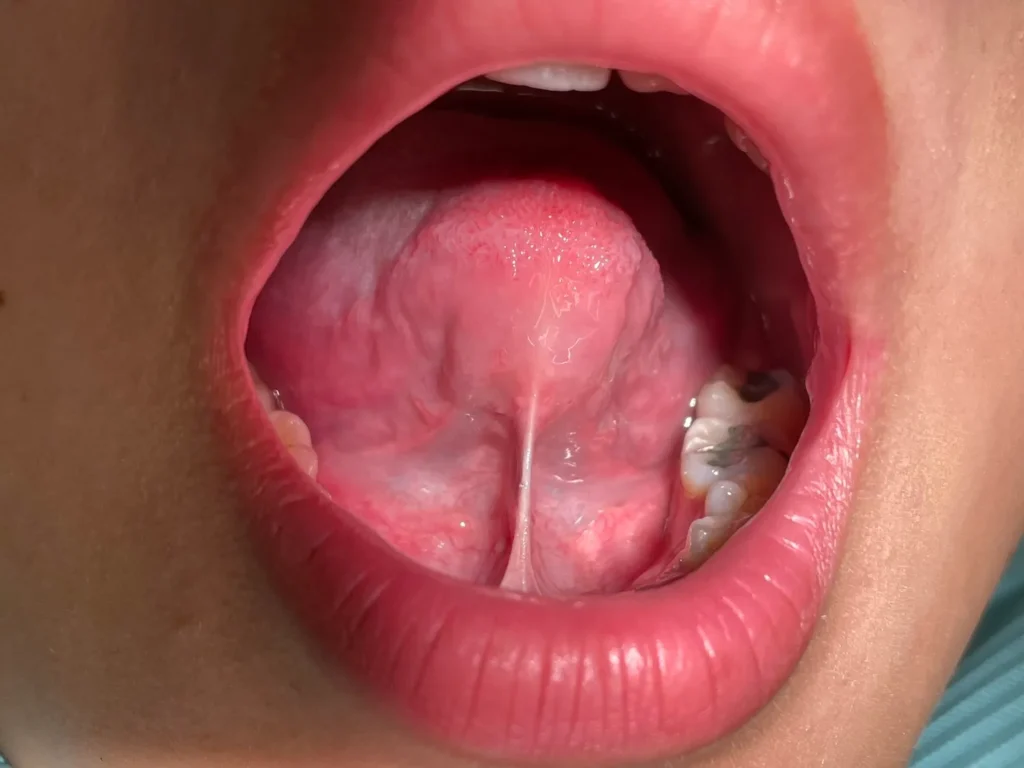0
+
years of combined experience
0
+
Happy Patients
0
+
Dental Treatments
0
+
Dentists
Tongue tie, medically known as ankyloglossia, is a condition that may affect infants from birth. In simple terms, it occurs when a small piece of tissue, called the frenulum, is too short or thick, connecting the tongue too tightly to the bottom of the mouth. This limits the tongue’s movement, making it difficult for babies to perform essential actions like breastfeeding effectively.
Our team of dedicated dentists, led by Dr. Navasheilla Retna, specialises in diagnosing and treating tongue ties to ensure your baby’s comfort and well-being. If left untreated, tongue tie can lead to feeding issues, speech difficulties, and dental problems later in life. Let’s explore this condition in detail and how early intervention can make a significant difference.
years of combined experience
Happy Patients
Dental Treatments
Dentists
The exact cause of tongue tie remains unclear, but it’s believed to be related to genetic factors. Research shows that approximately 4-10% of newborns may experience some degree of tongue tie, with boys being more commonly affected than girls. Although not all tongue ties cause problems, those that restrict tongue movement significantly can interfere with breastfeeding, leading to discomfort for both the baby and the mother.
Breastfeeding is not just about feeding; it’s a bonding moment between mother and baby. However, if a baby has a tongue tie, this experience can become challenging. Babies rely heavily on their tongues to latch properly, create suction, and extract milk from the breast. A restricted tongue due to tongue tie can result in several breastfeeding problems, such as:
Difficulty Latching: Babies with tongue tie may struggle to get a good latch, leading to inadequate milk intake. This can leave them feeling hungry and irritable, causing stress for both the baby and the mother
Frequent Feeding Sessions: Because the baby cannot extract enough milk efficiently, they may need to feed more frequently, resulting in longer nursing sessions. This can be exhausting for new mothers, especially during nighttime feedings
Nipple Pain and Damage: Improper latching due to restricted tongue movement often leads to sore, cracked nipples. Many mothers who visit our clinic have reported severe pain during breastfeeding, which is a common sign of a possible tongue tie in their babies
Slow Weight Gain in Infants: If a baby is unable to breastfeed effectively, they may not gain weight at a healthy rate. This can be particularly worrying for parents, especially when they notice their baby is not thriving as expected
If you’re experiencing any of these issues, it’s essential to consult a pediatric dentist who can assess your baby’s tongue and provide the appropriate treatment. At Klinik Pergigian Alam Impian, we have the expertise and tools to diagnose and manage tongue ties with minimal discomfort.
Understanding the severity of a tongue tie can help determine the best treatment approach. Tongue ties are classified into four types based on how restrictive they are:

The good news is that tongue tie can be corrected by doing a procedure known as frenectomy. This procedure is done by our Paediatric Dental Specialist. This involves using sterile surgical scissors to snip the restrictive frenulum. The procedure is quick, typically taking less than five minutes, with minimal bleeding. It’s safe and effective, allowing babies to breastfeed immediately afterward. Mothers who have opted for this treatment at our clinic often report immediate improvement in their baby’s feeding ability.
Our pediatric dental specialist, Dr. Navasheilla Retna, has extensive experience in performing laser frenectomies, ensuring a smooth and stress-free experience for both the baby and parents.
In addition to surgical procedures, myofunctional therapy can be beneficial, especially for older children or adults who have developed compensatory habits due to a long-standing tongue tie. This therapy involves exercises to strengthen the tongue and improve its range of motion. It’s an excellent way to complement a frenectomy and enhance the outcomes. For children who have had difficulty with speech, myofunctional therapy can significantly improve their ability to pronounce certain sounds.


Tongue tie doesn’t just affect breastfeeding; it can also have long-term effects on a child’s speech development. When the tongue cannot move freely, it can make it harder for children to pronounce certain letters and sounds, particularly “t,” “d,” “l,” “r,” and “th” sounds. This can result in speech delays or articulation issues that may require therapy later on. Early treatment can help prevent these problems and support normal speech development.
If you suspect your baby has a tongue tie, it’s best to seek treatment as early as possible. The benefits of early intervention include:


Doctor of Dental Surgery (DDS), USM
DClinDent (Paediatric Dentistry), UKM
MFDSRCS (Edinburgh)
- 20 years as dentist with 10 Years as Paediatric Dental Specialist.
- Passionate in treating Kids & Teenagers (Tongue Tie Surgery, Sedation Dentistry and etc)

Bachelor of Dental Surgery (BDS), SEGi University
- 6 years of dental experience.
- Passionate in treating all category of patients

Bachelor of Dental Surgery (BDS), Manipal University (India)
- 6 years of dental experience.
- Passionate in treating all category of patients.
